ESP Citroen C4 PICASSO 2016 2.G Workshop Manual
[x] Cancel search | Manufacturer: CITROEN, Model Year: 2016, Model line: C4 PICASSO, Model: Citroen C4 PICASSO 2016 2.GPages: 527, PDF Size: 13.72 MB
Page 202 of 527
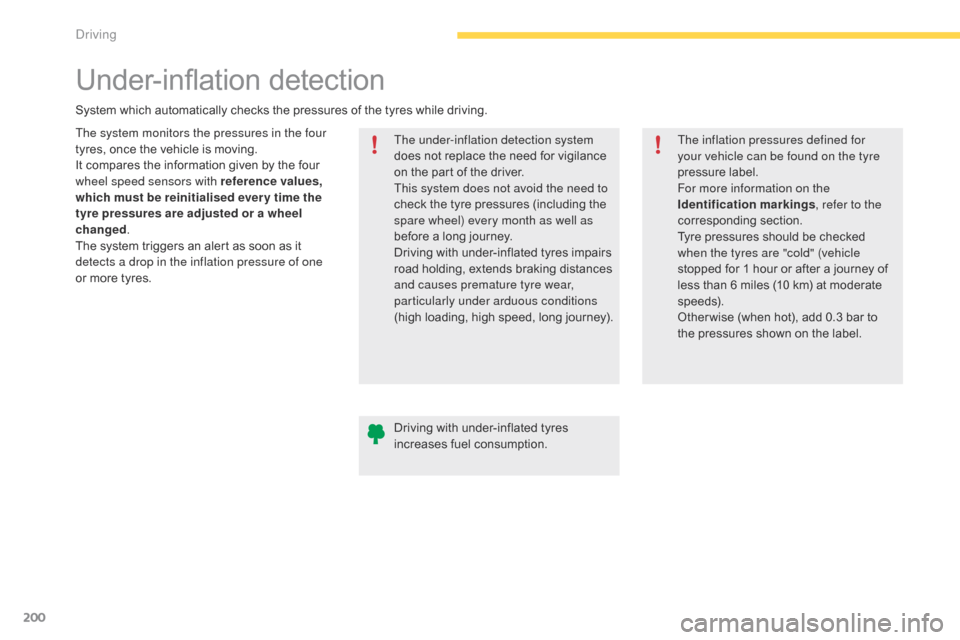
200
C4-Picasso-II_en_Chap04_conduite_ed01-2016
Under-inflation detection
The system monitors the pressures in the four
tyres,
 once  the  vehicle  is  moving.
It
 compares  the  information  given  by  the  four Â
w
heel speed sensors with reference values,
which must be reinitialised ever y time the
tyre pressures are adjusted or a wheel
changed .
The
 system  triggers  an  alert  as  soon  as  it Â
d
etects a drop in the inflation pressure of one
or
 more  tyres. The under-inflation detection system
does
 not  replace  the  need  for  vigilance Â
o
n  the  part  of  the  driver.
This system does not avoid the need to
check
 the  tyre  pressures  (including  the Â
s
pare wheel) every month as well as
before
 a  long  journey.
Driving
 with  under-inflated  tyres  impairs Â
r
oad  holding,  extends  braking  distances Â
a
nd causes premature tyre wear,
particularly under arduous conditions
(high
 loading,  high  speed,  long  journey).
System
 which  automatically  checks  the  pressures  of  the  tyres  while  driving.
The inflation pressures defined for
your vehicle can be found on the tyre
pressure
 label.
For more information on the
Identification markings , refer to the
corresponding
 s
ection.
Tyre
 pressures  should  be  checked Â
w
hen the tyres are "cold" (vehicle
stopped
 for  1  hour  or  after  a  journey  of Â
l
ess  than  6  miles  (10  km)  at  moderate Â
s
peeds).
Other wise
 (when  hot),  add  0.3  bar  to Â
t
he  pressures  shown  on  the  label.
Driving
 with  under-inflated  tyres Â
i
ncreases  fuel  consumption.
Driving
Page 205 of 527
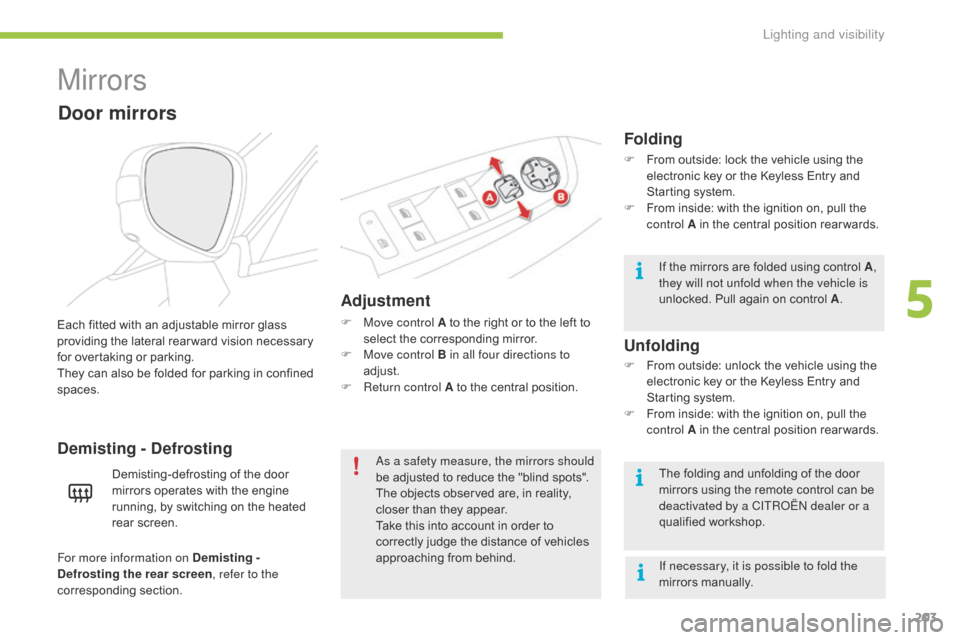
203
C4-Picasso-II_en_Chap05_eclairage-visibilite_ed01-2016
Mirrors
Adjustment
F Move control A to  the  right  or  to  the  left  to  s
elect  the  corresponding  mirror.
F
M
ove control B in all four directions to
adjust.
F
R
eturn control A  to  the  central  position.
Each
Â
fitted
Â
with
Â
an
Â
adjustable
Â
mirror
Â
glass
Â
p
roviding
Â
the
Â
lateral
Â
rear ward
Â
vision
Â
necessary
Â
f
or
Â
overtaking
Â
or
Â
parking.
They
Â
can
Â
also
Â
be
Â
folded
Â
for
Â
parking
Â
in
Â
confined
Â
spa
ces.
Demisting - Defrosting
Door mirrors
Demisting-defrosting of the door m irrors  operates  with  the  engine Â
r
unning,  by  switching  on  the  heated Â
re
ar
 sc
reen. As a safety measure, the mirrors should
be
 adjusted  to  reduce  the  "blind  spots".
The
 objects  observed  are,  in  reality, Â
c
loser  than  they  appear.
Take
 this  into  account  in  order  to Â
c
orrectly  judge  the  distance  of  vehicles Â
a
pproaching  from  behind.
Folding
F From outside:  lock  the  vehicle  using  the  e
lectronic  key  or  the  Keyless  Entry  and Â
S
tarting  system.
F
Â
F
rom  inside:  with  the  ignition  on,  pull  the Â
c
ontrol A  in  the  central  position  rear wards.
If
 the  mirrors  are  folded  using  control  A,
they will not unfold when the vehicle is
unlocked.
 Pull  again  on  control  A.
The
 folding  and  unfolding  of  the  door Â
m
irrors  using  the  remote  control  can  be Â
d
eactivated by a CITROĂ‹N dealer or a
qualified
 w
orkshop.
F
Â
F
rom  outside:  unlock  the  vehicle  using  the Â
e
lectronic  key  or  the  Keyless  Entry  and Â
S
tarting  system.
F
Â
F
rom  inside:  with  the  ignition  on,  pull  the Â
c
ontrol A  in  the  central  position  rear wards.
Unfolding
If necessary, it is possible to fold the
mirrors manually.
For more information on Demisting -
Defrosting the rear screen
, refer to the
corresponding
 s
ection.
5
Lighting and visibility
Page 209 of 527
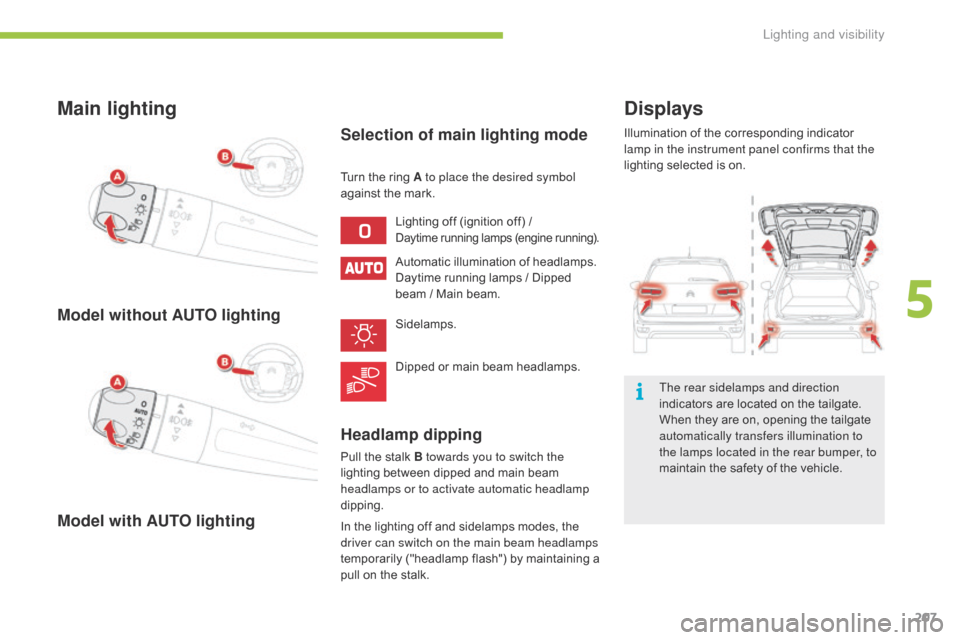
207
C4-Picasso-II_en_Chap05_eclairage-visibilite_ed01-2016
Displays
Illumination of the corresponding indicator lamp in the instrument panel confirms that the
lighting
 selected  is  on.
The rear sidelamps and direction
indicators
 are  located  on  the  tailgate. Â
W
hen  they  are  on,  opening  the  tailgate Â
a
utomatically transfers illumination to
the lamps located in the rear bumper, to
maintain
 the  safety  of  the  vehicle.
Main lighting
Lighting off (ignition off) /Daytime running lamps (engine running).
Automatic illumination of headlamps.
D aytime  running  lamps  /  Dipped Â
b
eam  /  Main  beam.
Sidelamps.
Dipped
 or  main  beam  headlamps.
Turn
Â
the
Â
ring  A to place the desired symbol
against
Â
the  mark.
Selection of main lighting mode
Model without AUTO lighting
Model with AUTO lighting Headlamp dipping
Pull the stalk B towards you to switch the
l ighting  between  dipped  and  main  beam Â
h
eadlamps or to activate automatic headlamp
dipping.
In
 the  lighting  off  and  sidelamps  modes,  the Â
d
river can switch on the main beam headlamps
temporarily
 ("headlamp  flash")  by  maintaining  a Â
p
ull  on  the  stalk.
5
Lighting and visibility
Page 212 of 527
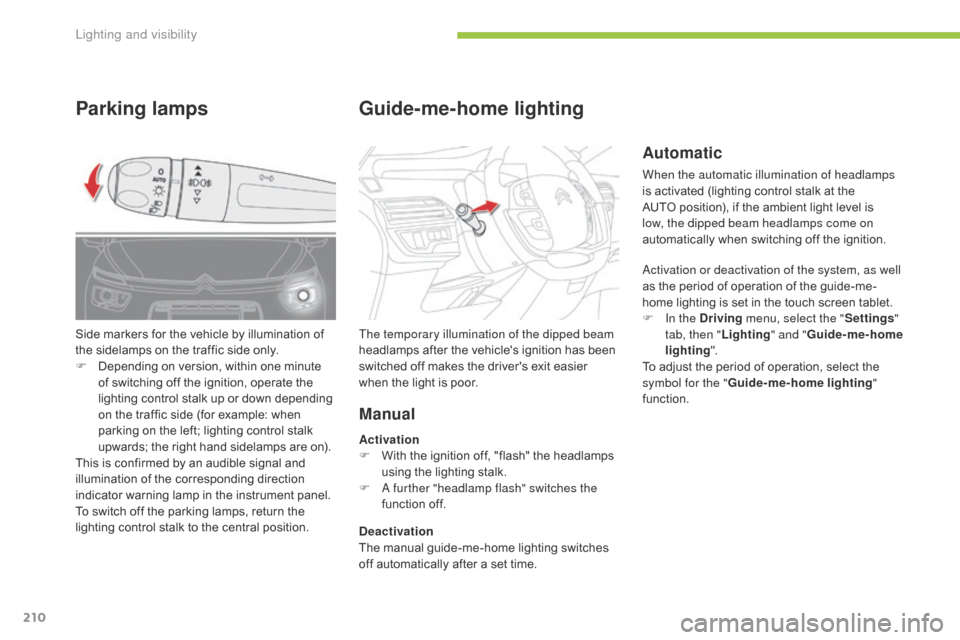
210
C4-Picasso-II_en_Chap05_eclairage-visibilite_ed01-2016
Automatic
When the automatic illumination of headlamps
is activated  (lighting  control  stalk  at  the Â
A
UTO  position),  if  the  ambient  light  level  is Â
l
ow, the dipped beam headlamps come on
automatically
 when  switching  off  the  ignition.
Activation or deactivation of the system, as well
as
 the  period  of  operation  of  the  guide-me-
home
 lighting  is  set  in  the  touch  screen  tablet.
F
I
n the Driving menu, select the " Settings"
tab, then " Lighting" and "Guide-me-home
lighting ".
To
 adjust  the  period  of  operation,  select  the Â
s
ymbol for the " Guide-me-home lighting "
function.
Parking lamps Guide-me-home lighting
Manual
Deactivation
The
 manual  guide-me-home  lighting  switches Â
o
ff  automatically  after  a  set  time.
The temporary illumination of the dipped beam
headlamps
 after  the  vehicle's  ignition  has  been Â
s
witched  off  makes  the  driver's  exit  easier Â
w
hen  the  light  is  poor.
Side
Â
markers
Â
for
Â
the
Â
vehicle
Â
by
Â
illumination
Â
of
Â
t
he
Â
sidelamps
Â
on
Â
the
Â
traffic
Â
side
Â
only.
F
Â
D
epending
Â
on
Â
version,
Â
within
Â
one
Â
minute
Â
o
f
Â
switching
Â
off
Â
the
Â
ignition,
Â
operate
Â
the
Â
l
ighting
Â
control
Â
stalk
Â
up
Â
or
Â
down
Â
depending
Â
o
n
Â
the
Â
traffic
Â
side
Â
(for
Â
example:
Â
when
Â
p
arking
Â
on
Â
the
Â
left;
Â
lighting
Â
control
Â
stalk
Â
u
pwards;
Â
the
Â
right
Â
hand
Â
sidelamps
Â
are
Â
on).
This
Â
is
Â
confirmed
Â
by
Â
an
Â
audible
Â
signal
Â
and
Â
i
llumination
Â
of
Â
the
Â
corresponding
Â
direction
Â
i
ndicator
Â
warning
Â
lamp
Â
in
Â
the
Â
instrument
Â
panel.
To
Â
switch
Â
off
Â
the
Â
parking
Â
lamps,
Â
return
Â
the
 l
ighting
Â
control
Â
stalk
Â
to
Â
the
Â
central
Â
position. Activation
F
Â
W
ith  the  ignition  off,  "flash"  the  headlamps Â
u
sing  the  lighting  stalk.
F
A f
urther "headlamp flash" switches the
function  off.
Lighting and visibility
Page 214 of 527

212
C4-Picasso-II_en_Chap05_eclairage-visibilite_ed01-2016
System which automatically changes between dipped  and  main  beam  according  to  the Â
a
mbient  light  level  and  the  driving  conditions, Â
u
sing  a  camera  located  at  the  top  of  the Â
w
indscreen. This
 system  is  a  driving  aid.
The driver remains responsible for the
vehicle's
 lighting,  its  correct  use  for  the Â
p
revailing  conditions  of  light,  visibility Â
a
nd  traffic  and  observation  of  driving Â
a
nd  vehicle  regulations.
The system will be operational as soon
as
Â
you
Â
have
Â
exceeded
Â
15
Â
mph
Â
(25Â km/h).
If the speed drops below 9 mph
(15Â km/h),
 the  system  no  longer
 ope
rates.
Automatic headlamp dipping
Lighting and visibility
Page 218 of 527

216
C4-Picasso-II_en_Chap05_eclairage-visibilite_ed01-2016
Cornering lighting
This system, if fitted to your vehicle, makes use  of  the  beam  from  a  front  foglamp  to Â
i
lluminate the inside of a bend, when the
main or dipped beam headlamps are on and
the
 vehicle  speed  is  below  25  mph  (40  km/h) Â
(
urban  driving,  winding  road,  junctions,  parking Â
m
anoeuvres...). with cornering lighting
without cornering lighting
Switching on
This system starts:
-  w hen  the  corresponding  direction  indicator Â
i
s switched on,
or
-
Â
f
rom  a  certain  angle  of  rotation  of  the Â
s
teering
 w
heel.
Switching off
The system does not operate:
-  b elow  a  certain  angle  of  rotation  of  the Â
s
teering
 w
heel,
-
Â
a
bove  25  mph  (40  km/h),
-
Â
w
hen  reverse  gear  is  engaged.
The
 cornering  lighting  can  be  activated  or Â
d
eactivated in the Driving
Â
menu.
F
Sel
ect the " Settings " tab, then " Lighting"
and " Directional headlamps ".
Lighting and visibility
Page 233 of 527
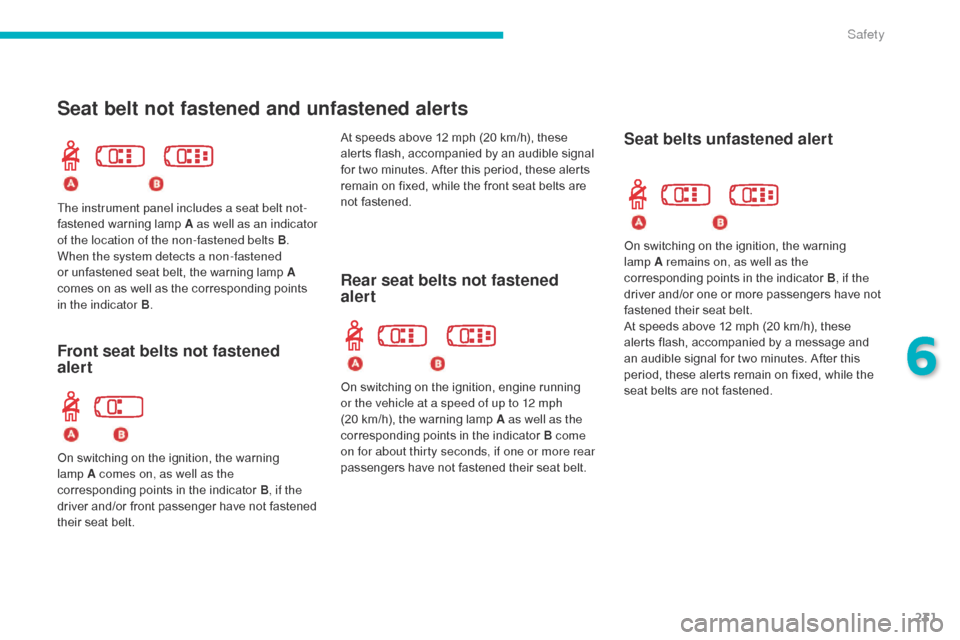
231
C4-Picasso-II_en_Chap06_securite_ed01-2016
Seat belt not fastened and unfastened alerts
Rear seat belts not fastened
alert
The instrument panel includes a seat belt not-
fastened w
arning lam p A as well as an indicator
of the location of the non-fastened belts B .
When the system detects a non-fastened
or
 unfastened  seat  belt,  the  warning  lamp  A
comes
 on  as  well  as  the  corresponding  points Â
i
n the indicator B .
On
 switching  on  the  ignition,  engine  running Â
o
r the vehicle at a speed of up to 12 mph
(20
 km/h),  the  warning  lamp  A as well as the
corresponding
 points  in  the  indicator  B come
on for about thirty seconds, if one or more rear
passengers
 have  not  fastened  their  seat  belt.
Seat belts unfastened alert
Front seat belts not fastened
alert
On switching on the ignition, the warning lam p A comes on, as well as the
corresponding points
 in  the  indicator  B, if the
driver
 and/or  front  passenger  have  not  fastened Â
t
heir  seat  belt. At
 speeds  above  12  mph  (20  km/h),  these Â
a
lerts  flash,  accompanied  by  an  audible  signal Â
f
or  two  minutes.  After  this  period,  these  alerts Â
r
emain  on  fixed,  while  the  front  seat  belts  are Â
n
ot  fastened.
On  switching  on  the  ignition,  the  warning Â
lam
p
A remains on, as well as the
corresponding  points  in  the  indicator  B
, if the
driver  and/or  one  or  more  passengers  have  not Â
f
astened  their  seat  belt.
At  speeds  above  12  mph  (20  km/h),  these Â
a
lerts  flash,  accompanied  by  a  message  and Â
a
n  audible  signal  for  two  minutes.  After  this Â
p
eriod,  these  alerts  remain  on  fixed,  while  the Â
s
eat  belts  are  not  fastened.
6
Safety
Page 234 of 527
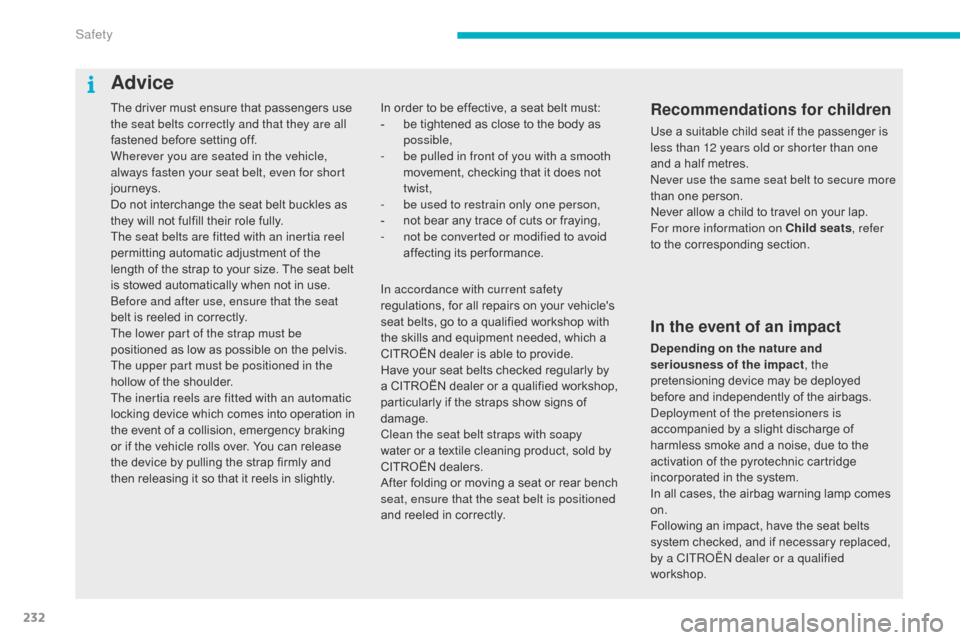
232
C4-Picasso-II_en_Chap06_securite_ed01-2016
The driver must ensure that passengers use the seat belts correctly and that they are all
fastened
 before  setting  off.
Wherever you are seated in the vehicle,
always fasten your seat belt, even for short
journeys.
Do
 not  interchange  the  seat  belt  buckles  as Â
t
hey  will  not  fulfill  their  role  fully.
The seat belts are fitted with an inertia reel
permitting
 automatic  adjustment  of  the Â
l
ength  of  the  strap  to  your  size.  The  seat  belt Â
i
s  stowed  automatically  when  not  in  use.
Before and after use, ensure that the seat
belt
 is  reeled  in  correctly.
The lower part of the strap must be
positioned
 as  low  as  possible  on  the  pelvis.
The upper part must be positioned in the
hollow
 of  the  shoulder.
The inertia reels are fitted with an automatic
locking
 device  which  comes  into  operation  in Â
t
he  event  of  a  collision,  emergency  braking Â
o
r  if  the  vehicle  rolls  over.  You  can  release Â
t
he  device  by  pulling  the  strap  firmly  and Â
t
hen  releasing  it  so  that  it  reels  in  slightly.Recommendations for children
Use a suitable child seat if the passenger is less than 12 years old or shorter than one
and
 a  half  metres.
Never use the same seat belt to secure more
than
 one  person.
Never
 allow  a  child  to  travel  on  your  lap.
For more information on Child seats , refer
to
 the  corresponding  section.
In
Â
order
Â
to
Â
be
Â
effective,
Â
a
Â
seat
Â
belt
Â
must:
-
 b
e
Â
tightened
Â
as
Â
close
Â
to
Â
the
Â
body
Â
as
 p
ossible,
-
b
e pulled in front of you with a smooth
movement,
Â
checking
Â
that
Â
it
Â
does
Â
not
Â
t
wist,
-
b
e used to restrain only one person,
-
Â
n
ot
Â
bear
Â
any
Â
trace
Â
of
Â
cuts
Â
or
Â
fraying,
-
n
ot be converted or modified to avoid
affecting
 it
s
 p
erformance.
In the event of an impact
Depending on the nature and
seriousness of the impact , the
pretensioning
 device  may  be  deployed Â
b
efore  and  independently  of  the  airbags. Â
D
eployment of the pretensioners is
accompanied
 by  a  slight  discharge  of Â
h
armless  smoke  and  a  noise,  due  to  the Â
a
ctivation  of  the  pyrotechnic  cartridge Â
i
ncorporated  in  the  system.
In
 all  cases,  the  airbag  warning  lamp  comes Â
o
n.
Following
 an  impact,  have  the  seat  belts Â
s
ystem  checked,  and  if  necessary  replaced, Â
b
y a CITROĂ‹N dealer or a qualified
workshop.
In accordance with current safety
regulations,
Â
for
Â
all
Â
repairs
Â
on
Â
your
Â
vehicle's
Â
s
eat
Â
belts,
Â
go
Â
to
Â
a
Â
qualified
Â
workshop
Â
with
 t
he
Â
skills
Â
and
Â
equipment
Â
needed,
Â
which
Â
a
 C
ITROĂ‹N
Â
dealer
Â
is
Â
able
Â
to
Â
provide.
Have
Â
your
Â
seat
Â
belts
Â
checked
Â
regularly
Â
by
Â
a
Â
CITROĂ‹N
Â
dealer
Â
or
Â
a
Â
qualified
Â
workshop,
Â
p
articularly
Â
if
Â
the
Â
straps
Â
show
Â
signs
Â
of
Â
d
amage.
Clean the seat belt straps with soapy
water
Â
or
Â
a
Â
textile
Â
cleaning
Â
product,
Â
sold
Â
by
Â
C
ITROĂ‹N
Â
dealers.
After
Â
folding
Â
or
Â
moving
Â
a
Â
seat
Â
or
Â
rear
Â
bench
Â
s
eat, ensure that the seat belt is positioned
and
Â
reeled
Â
in
Â
correctly.
Advice
Safety
Page 237 of 527
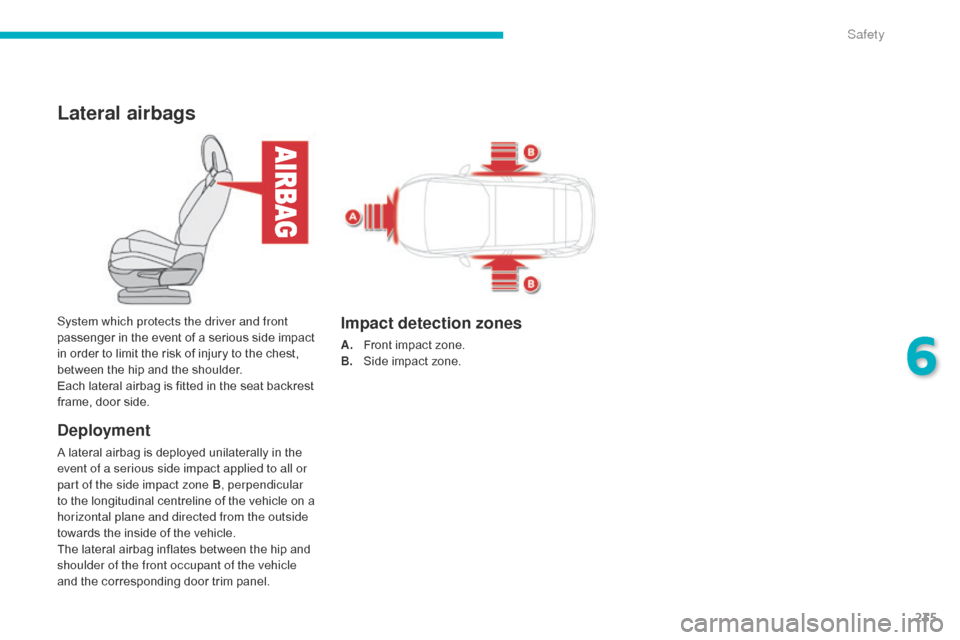
235
C4-Picasso-II_en_Chap06_securite_ed01-2016
Lateral airbags
Deployment
A lateral airbag is deployed unilaterally in the event of a serious side impact applied to all or
part of the side impact zone B, perpendicular
to
 the  longitudinal  centreline  of  the  vehicle  on  a Â
h
orizontal plane and directed from the outside
towards
 the  inside  of  the  vehicle.
The
 lateral  airbag  inflates  between  the  hip  and Â
s
houlder of the front occupant of the vehicle
and
 the  corresponding  door  trim  panel.
System which protects the driver and front
passenger
 in  the  event  of  a  serious  side  impact Â
i
n  order  to  limit  the  risk  of  injury  to  the  chest, Â
b
etween  the  hip  and  the  shoulder.
Each  lateral  airbag  is  fitted  in  the  seat  backrest Â
f
rame,  door  side.
Impact detection zones
A. Front
 impact  zone.
B. S ide  impact  zone.
6
Safety
Page 238 of 527
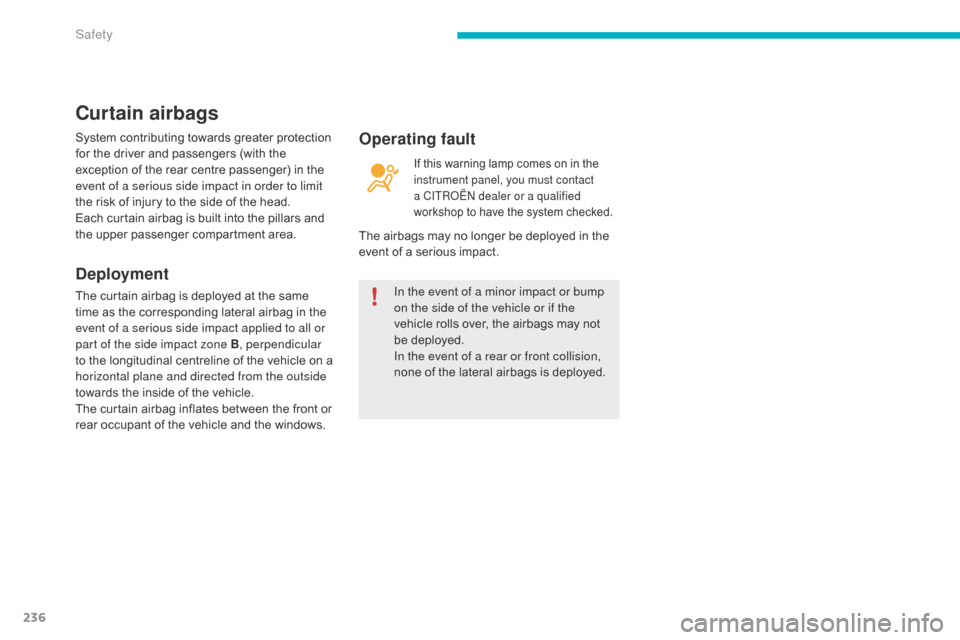
236
C4-Picasso-II_en_Chap06_securite_ed01-2016
In the event of a minor impact or bump
on the side of the vehicle or if the
vehicle rolls  over,  the  airbags  may  not Â
b
e  deployed.
In the event of a rear or front collision,
none
 of  the  lateral  airbags  is  deployed.
System
Â
contributing
Â
towards
Â
greater
Â
protection
Â
f
or
Â
the
Â
driver
Â
and
Â
passengers
Â
(with
Â
the
Â
e
xception
Â
of
Â
the
Â
rear
Â
centre
Â
passenger)
Â
in
Â
the
Â
e
vent of a serious side impact in order to limit
the
Â
risk
Â
of
Â
injury
Â
to
Â
the
Â
side
Â
of
Â
the
Â
head.
Each
Â
curtain
Â
airbag
Â
is
Â
built
Â
into
Â
the
Â
pillars
Â
and
Â
t
he
Â
upper
Â
passenger
Â
compartment
Â
area.
Curtain airbags
Deployment
The curtain airbag is deployed at the same t
ime  as  the  corresponding  lateral  airbag  in  the Â
e
vent of a serious side impact applied to all or
part of the side impact zone B, perpendicular
to
 the  longitudinal  centreline  of  the  vehicle  on  a Â
h
orizontal plane and directed from the outside
towards
 the  inside  of  the  vehicle.
The
 curtain  airbag  inflates  between  the  front  or Â
r
ear  occupant  of  the  vehicle  and  the  windows.
If this warning lamp comes on in the instrument panel, you must contact
a CITROĂ‹N dealer or a qualified
workshop
 to  have  the  system  checked.
Operating fault
The airbags may no longer be deployed in the event  of  a  serious  impact.
Safety